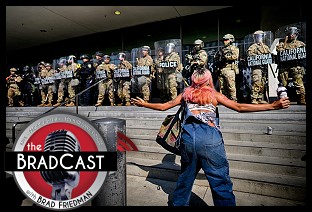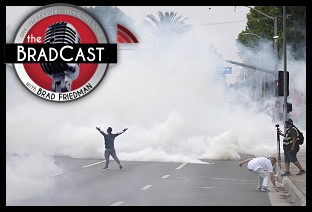Guest Blogged by John Gideon of VotersUnite.Org
Last night Kitty, sans Lou who is in Texas, reported on election judge training in the state of Maryland. Taking place at the University of Maryland, all election judges, whether experienced or not, are subject to the new training. However, with elections less than two weeks away, officials are questioning the preparedness of the volunteer poll workers who must learn the new Diebold e-voting system. Let's hope Diebold will not be able to blame all of their failures on the voter and the poll workers. (That's probably too much to wish for though)
The text-transcript of Wednesday's segment on Lou Dobbs Tonight follows in full...
Now, more problems tonight with electronic voting. Just two weeks before Election Day, the state of Maryland had a disastrous primary. Equipment failed. Election judges didn't have a clue how to handle the new brand of e-voting machines.
The electronic machines have to stay, but now poll workers are being sent back to school.
(BEGIN VIDEOTAPE)
UNIDENTIFIED MALE: Just put that initial there.
PILGRIM (voice over): Election judges in Baltimore, Maryland, volunteer, and then they have to take a class.
UNIDENTIFIED MALE: I will not need a store without a receipt.
PILGRIM: The Schaefer Center at the University of Baltimore has trained 5,000 judges.
UNIDENTIFIED FEMALE: Once it fits comfortably and the light turns solid green, stop.
PILGRIM: All the election judges, even if they served before, are being trained. And Baltimore is also recruiting hundreds more to help.
For the September primary, poll workers showed up late. Some didn't show up at all. And many had no clue how to operate the new electronic machines. Election officials say some poll workers hadn't even seen the machines until Election Day.
EDWARD HAILES, ADVANCEMENT PROJECT: Sometimes they're referred to as the weakest link in our democracy. But everyone acknowledges that they are the background of our democracy, and we need sufficient numbers of well-trained poll workers available on Election Day to prevent any potential train wrecks.
PILGRIM: The course includes training on these problematic electronic poll books. After classes election workers know how to check in voters and process votes.
JOHN WILLIS, UNIVERSITY OF BALTIMORE: It's a very hard task, particularly when you change systems. We just shouldn't be doing this three weeks before the election. We need to start this process well before the election. It's an administrative management problem.
PILGRIM: Baltimore has scheduled more than 80 classes running up to two or three days before the election. The president of the Baltimore Board of Elections says the new equipment had him concerned from the beginning.
ARMSTEAD JONES, PRESIDENT, BALTIMORE ELECTION BOARD: I had anticipated the issues. First of all, Baltimore city was never in favor of getting the Diebold equipment. We fought that issue for two years. And then, of course, mandated by law, the state had the unified system, and we finally had to come on board.
(END VIDEOTAPE)
PILGRIM: Now, botched elections with electronic voting machines are often blamed on the poll workers. Voting machine companies defend their technology and blame problems on human error. Now, Baltimore officials say, after these classes, if the technology fails, manufacturers won't be able to blame the poll workers anymore.


 Mamdani Primary 'Win' Augurs New Generation of Progressives Rising: 'BradCast' 6/25/25
Mamdani Primary 'Win' Augurs New Generation of Progressives Rising: 'BradCast' 6/25/25 U.S. Authoritarianism Under-way (But We're Still Here to Fight It): 'BradCast' 6/24/25
U.S. Authoritarianism Under-way (But We're Still Here to Fight It): 'BradCast' 6/24/25 'Green News Report' 6/24/25
'Green News Report' 6/24/25
 'Anti-War' Trump Attacks a Mid-East Nation on False Claims About WMD: 'BradCast' 6/23/25
'Anti-War' Trump Attacks a Mid-East Nation on False Claims About WMD: 'BradCast' 6/23/25  Sunday 'Peacemaker' Toons
Sunday 'Peacemaker' Toons Senate Health Care Cuts 'More Extreme' Than House Version: 'BradCast' 6/19/25
Senate Health Care Cuts 'More Extreme' Than House Version: 'BradCast' 6/19/25 'Green News Report' 6/19/25
'Green News Report' 6/19/25 What 'Anti-War President'? MAGA Civil War Over Trump, Iran: 'BradCast' 6/18/25
What 'Anti-War President'? MAGA Civil War Over Trump, Iran: 'BradCast' 6/18/25 Trump Calls for 'Remigration', a Codeword for 'Ethnic Cleansing': 'BradCast' 6/17/25
Trump Calls for 'Remigration', a Codeword for 'Ethnic Cleansing': 'BradCast' 6/17/25 'Green News Report' 6/17/25
'Green News Report' 6/17/25 Last Weekend Today: 'BradCast' 6/16/25
Last Weekend Today: 'BradCast' 6/16/25 Sunday 'Despot Times, Despot Measures' Toons
Sunday 'Despot Times, Despot Measures' Toons Then They Came for the U.S. Senators: 'BradCast' 6/12/25
Then They Came for the U.S. Senators: 'BradCast' 6/12/25 'Green News Report' 6/12/25
'Green News Report' 6/12/25 Lawless Trump Warms Up for Insurrection Act: 'BradCast' 6/11/25
Lawless Trump Warms Up for Insurrection Act: 'BradCast' 6/11/25 Trump Inciting Violence, State of Fear in L.A., Elsewhere: 'BradCast' 6/10/25
Trump Inciting Violence, State of Fear in L.A., Elsewhere: 'BradCast' 6/10/25 Nevermind Elon and Epstein Files, Trump Declares L.A. 'Riots'!: 'BradCast' 6/9/25
Nevermind Elon and Epstein Files, Trump Declares L.A. 'Riots'!: 'BradCast' 6/9/25 'Jesus Weeps' at Trump's
'Jesus Weeps' at Trump's 300k 'Preventable' Deaths Since Trump USAID Shutdown: 'BradCast' 6/4/25
300k 'Preventable' Deaths Since Trump USAID Shutdown: 'BradCast' 6/4/25 Storm Warnings: 'BradCast' 6/3/25
Storm Warnings: 'BradCast' 6/3/25 SCOTUS Ignores Own Precedents In Recent 'Emergency' Rulings: 'BradCast' 6/2/25
SCOTUS Ignores Own Precedents In Recent 'Emergency' Rulings: 'BradCast' 6/2/25 'A World of Tyrants, Bribes, and Influence': 'BradCast' 5/22/25
'A World of Tyrants, Bribes, and Influence': 'BradCast' 5/22/25
 VA GOP VOTER REG FRAUDSTER OFF HOOK
VA GOP VOTER REG FRAUDSTER OFF HOOK Criminal GOP Voter Registration Fraud Probe Expanding in VA
Criminal GOP Voter Registration Fraud Probe Expanding in VA DOJ PROBE SOUGHT AFTER VA ARREST
DOJ PROBE SOUGHT AFTER VA ARREST Arrest in VA: GOP Voter Reg Scandal Widens
Arrest in VA: GOP Voter Reg Scandal Widens ALL TOGETHER: ROVE, SPROUL, KOCHS, RNC
ALL TOGETHER: ROVE, SPROUL, KOCHS, RNC LATimes: RNC's 'Fired' Sproul Working for Repubs in 'as Many as 30 States'
LATimes: RNC's 'Fired' Sproul Working for Repubs in 'as Many as 30 States' 'Fired' Sproul Group 'Cloned', Still Working for Republicans in At Least 10 States
'Fired' Sproul Group 'Cloned', Still Working for Republicans in At Least 10 States FINALLY: FOX ON GOP REG FRAUD SCANDAL
FINALLY: FOX ON GOP REG FRAUD SCANDAL COLORADO FOLLOWS FLORIDA WITH GOP CRIMINAL INVESTIGATION
COLORADO FOLLOWS FLORIDA WITH GOP CRIMINAL INVESTIGATION CRIMINAL PROBE LAUNCHED INTO GOP VOTER REGISTRATION FRAUD SCANDAL IN FL
CRIMINAL PROBE LAUNCHED INTO GOP VOTER REGISTRATION FRAUD SCANDAL IN FL Brad Breaks PA Photo ID & GOP Registration Fraud Scandal News on Hartmann TV
Brad Breaks PA Photo ID & GOP Registration Fraud Scandal News on Hartmann TV  CAUGHT ON TAPE: COORDINATED NATIONWIDE GOP VOTER REG SCAM
CAUGHT ON TAPE: COORDINATED NATIONWIDE GOP VOTER REG SCAM CRIMINAL ELECTION FRAUD COMPLAINT FILED AGAINST GOP 'FRAUD' FIRM
CRIMINAL ELECTION FRAUD COMPLAINT FILED AGAINST GOP 'FRAUD' FIRM RICK SCOTT GETS ROLLED IN GOP REGISTRATION FRAUD SCANDAL
RICK SCOTT GETS ROLLED IN GOP REGISTRATION FRAUD SCANDAL VIDEO: Brad Breaks GOP Reg Fraud Scandal on Hartmann TV
VIDEO: Brad Breaks GOP Reg Fraud Scandal on Hartmann TV RNC FIRES NATIONAL VOTER REGISTRATION FIRM FOR FRAUD
RNC FIRES NATIONAL VOTER REGISTRATION FIRM FOR FRAUD EXCLUSIVE: Intvw w/ FL Official Who First Discovered GOP Reg Fraud
EXCLUSIVE: Intvw w/ FL Official Who First Discovered GOP Reg Fraud GOP REGISTRATION FRAUD FOUND IN FL
GOP REGISTRATION FRAUD FOUND IN FL

































